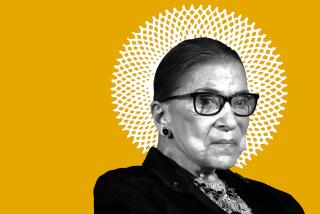A lawyer who champions civility more than civil suits
- Share via
WASHINGTON — In this age of epithets on the Senate floor and brawls on the basketball court, Steven Michael Selzer is a crusader for civility. He wants you to slow down and think more about others. It will be good for you, he argues, and good for all of us.
Selzer often seems formal, even a little stiff. He tends to keep his suit coat buttoned, and he smiles a lot. To all appearances, he is a mild-mannered Rockville, Md., lawyer.
But if your style is to forgo politeness and consideration, you might want to make sure that Selzer isn’t in the vicinity. He is a nice guy, to be sure, but he also has a backbone.
This year he received a call from a lawyer who was “disrespectful, loud, out of control and then profane.” Selzer waited a week, hoping the lawyer would offer an apology. When nothing happened, Selzer sent a letter to the lawyer, demanding one. “(Y)our demeanor was despicable,” he wrote. He sent a copy to the lawyer’s managing partner.
He cited the code of civility of the Bar Assn. of Montgomery County. Selzer knows the code well because he helped write it. The managing partner also knew it, and he called Selzer to apologize on the offending lawyer’s behalf. “Cross the line,” says Selzer, “and you have to pay a price.”
Selzer, 57, who has been practicing law in Maryland for 32 years, does not want only lawyers to be nicer to one another. “The whole country is hurting for civility,” he says.
In 2000 he published “By George!: Mr. Washington’s Guide to Civility Today,” a slim volume that reproduces 110 rules George Washington purportedly wrote out as a teenager about 250 years ago. Selzer likes to quote the final rule: “Labor to keep alive in your breast that little spark of celestial fire called conscience.”
Some, such as Rule 13, seem out of date: “Kill no vermin, as fleas, lice, ticks, etc., in the sight of others.”
A few are timeless. “Speak not evil of the absent, for it is unjust,” reads Rule 89.
In what some might consider a breach of civility among writers and publishers, Selzer’s version of Washington’s rules does not acknowledge that they had been previously published. The historian Richard Brookhiser put them out in 1997, in an equally slim volume titled “Rules of Civility.” The books are similar, with Brookhiser and Selzer each offering brief comments on Washington’s maxims. Selzer says he is not sure whether he was aware of Brookhiser’s book when he published his.
Selzer also does not indicate that historians doubt that the young Washington wrote of the rules. As etiquette expert Judith Martin observes in her 2003 book “Star-Spangled Manners,” “these rules ... had been written by French Jesuits, and he learned them from a well-used schoolbook translation.” Brookhiser writes that it is not clear how Washington encountered the rules.
Selzer observes that “no one can state with certainty” how Washington came to write the rules and says he believes they are a compilation of existing material and Washington’s thoughts. In any event, he says, he was interested in publishing the rules as a contemporary teaching tool, not a historical document.
Use them to teach, he does. In September he visited a bank in his county to tell its staff members how promoting civility might help prevent sexual harassment in the workplace. “Please understand that civility ties in directly to what I’m talking about -- which is a violation of the law,” he warned the bank employees.
His campaign for civility takes many forms. The book has led to speaking engagements and a few broadcast appearances. Last year he wrote an article in the Maryland Bar Journal promoting civility among lawyers. He has completed a manuscript on civility in business settings and is working on a new version of Washington’s rules but with a better publicity campaign.
“By George!” is not his first book. In the mid-1990s he published “Life’s Little Relaxation Book,” a compendium of pithy, soothing instructions. “Get in bed early on a winter’s night” is one. “Read to children and watch the expressions on their faces” is another. In the book are the seeds of his civility campaign. “Let it go; be tolerant,” is a third bit of advice.
During a visit to a historical society in Charleston, S.C., in 1998, Selzer found a dusty parchment inscribed by George Washington containing the 110 rules. Even though Selzer has bachelor’s and law degrees from George Washington University, he had never heard of the rules. A few weeks later he was using reference books in the Rockville library to clarify the meaning of Washington’s 18th century English. The rules gave him the idea for his second book.
Selzer experienced the absence of civility early on. “I grew up in central New Jersey, a Mafia training ground, where I saw people basically extorting money from others or fighting with others on a daily basis,” he says. One day, when Selzer was 14 or 15, a bully with a knife asked him for his lunch money. Selzer said no and was cut in the ensuing scuffle. But the bully emerged from the fight in worse shape. It was a lesson in the need to match a principled stand with toughness.
In what is certainly a civil act, Selzer donates a share of his earnings from “By George!” and “Life’s Little Relaxation Book” to cancer research.
Civility takes time, Selzer says. When he asks you how you are, he pauses. He wants to hear the answer.
More to Read
Sign up for Essential California
The most important California stories and recommendations in your inbox every morning.
You may occasionally receive promotional content from the Los Angeles Times.













